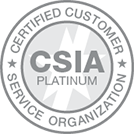Do your employees have the authority to make decisions, bend the rules, issue credits and refunds, and take other steps on behalf of the customer without getting permission from a supervisor? If not, they are not empowered — and that could be undermining your customer service efforts.
One way to improve the customer satisfaction of your organization is by empowering frontline employees so they can provide better customer service. To get passionate customers, you need passionate employees who are empowered to do the right thing. Empowerment is all about providing people with the knowledge, skills, authority, and desire to decide and act. Most importantly, empowerment is about senior management believing in the organization’s culture and trusting the decision-making abilities and expertise of their staff.
Training people to think for themselves so they can act within the rules, policies, and procedures of the organization is crucial for success. A simple problem-solving framework should be identified so employees have a shared language and thought process for diagnosing root causes of problems and exploring customer needs. Staff that are trained to listen, exhibit empathy, and display a great attitude contribute to a memorable customer experience. This freedom to act within reasonable limits produces highly customer-oriented employees which should be the goal of any customer service program.
For Example...
Virgin America strives to provide customers with more than just a flight from one destination to another: According to Richard Branson, Virgin is in “the experience business.” Employees of every level and department are encouraged to provide customers with a complete experience, encompassing everything from the greeting they receive at check-in to the service they receive within the mood-lit aircraft. Senior management must specifically define where front-line employees are and aren’t allowed to deviate from established rules and processes — and then must give them the flexibility to experiment with new ways for serving customers.
The Ritz-Carlton has for many years given staff $2,000 of discretion per guest to be used to solve any customer complaint in the manner the employee feels is appropriate. The Ritz-Carlton defined the standards they expect their employees to reach. Then the employees are allowed to help customers however is needed — so as long as the standards are maintained, there is no need for formal guidelines on every single problem that might occur.
| |
Empower Employees
Deb Dupnik is the director of certification and customer service for the Commission for Case Manager Certification




